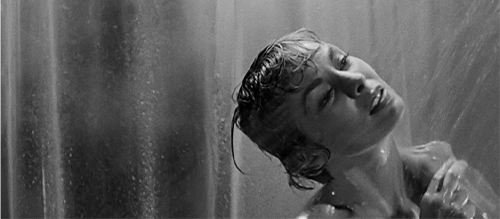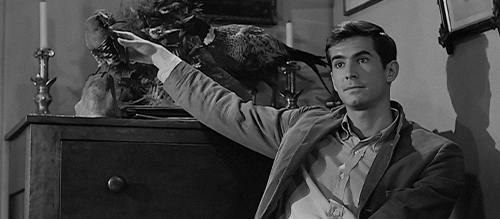Psycho (1960) Review

Psycho (1960)
Director: Alfred Hitchcock
Screenwrites: Joseph Stefano
Starring: Anthony Perkins, Vera Miles, John Gavin, Janet Leigh, Martin Balsam, John McIntire
Some films enter cultural consciousness almost by accident. They might not be the greatest of cinematic spectacles, but something about them triggers a nerve. A snatch of dialogue, a specific shot, a particular character. Some films manage to somehow tip the scales the instant they’re released. For too many reasons to name, Psycho is considered one of the greatest films of all time, and it rightly deserves that honour.
Directed by the legendary Alfred Hitchcock (the Master of Suspense behind such films as Rear Window, Vertigo, North by Northwest, and dozens of others), the film takes Robert Bloch’s original novel and, with a few tweaks, in the words of This Is Spinal Tap, dials it up to eleven. Marion Crane (Janet Leigh) works as an estate agent, spending her lunch hours with her lover, Sam, whenever he’s in town. Asked to take $40,000 in cash to the bank, she makes the sudden decision to take the money and run across the country to Sam in a bid to start a new life. A storm hits and, lost in the rain, she winds up at the now legendary Bates Motel, with a sinister American Gothic mansion overlooking the motel, run by the shy Norman Bates (Anthony Perkins) and his mother, who in his words, “isn’t quite herself today.”
The film was hailed as a masterpiece almost immediately after release, which when you consider the now well-documented troubles it took to get the film made (included in the 2012 biopic Hitchcock, starring Anthony Hopkins) is one of those incredible stories that happens only once in a blue moon. Using cheaper black-and-white film with his TV crew and funding it all himself, Hitchcock uses every ounce of cinematic mastery possible to keep us squirming in our seats from opening to end. Even before the film, Hitchcock made and released a six-minute trailer, a whole miniature documentary film in itself, to advertise Psycho. Film critics were not allowed to see the film ahead of time to keep the twists a secret, and audiences were not allowed in once a showing had begun, something now standard practice but radical at the time. Everything said that this was going to be an event movie, a sensation thriller, in the way that Wilkie Collins’s “The Woman In White” had created the now-called ‘sensation literature’ genre just over a century earlier in 1859.
What a film we are treated to. The tense opening score from Bernard Hermann, using only a string quartet for the whole film to match Hitchcock’s black and white shooting, grabs you from the opening bars and doesn’t stop. When the famous shower scene kicks in, with the violins shrieking at the top of their range, it is so incredible that Hitchcock immediately recognised its quality by doubling Hermann’s salary and putting him second billing in the credits only underneath himself. These strings follow incredible performances from Leigh, Perkins, and Vera Miles, through the city and out into the sticks of the Bates Motel, a sight now so famous we almost recognise it without consciously understanding where from.

Every shot is placed so delicately, with such expertise and control, that it’s impossible to detect a flaw. When a single shot is required, Hitch keeps it. When it requires 50 cuts in 45 seconds, he goes for it. When the angle needs to change, there it moves. It is the result of 35 years of directorial triumphs and failures to know with a guttural instinct exactly how the tale should be told. Auteur theory is often made a mockery of, but there’s no denying that Hitchcock’s fingerprints are in every frame of the finished product. His Oscar nomination for the direction is well-earned and well-deserved.
Perkins’s naïve Norman is instantly endearing, and Perkins’s lack of an Academy Award nomination is inexplicable. Never mind that the other nominations that year were Burt Lancaster, Trevor Howard, Jack Lemmon, Laurence Olivier, and Spencer Tracy; Perkins’s performance has gone on to become immortal in cinema in a way that few other performances have done before or since. Leigh and Miles put in likewise iconic turns as the two Crane sisters, but it is Perkins that cinema will always remember. It is a trailblazing performance, masterful in its balance, looked to and imitated but never repeated, even by Perkins in future sequels.
All of these elements allow a masterful script to be put on screen in a blaze of glory. Never pausing, it always pushes on in a blood-curdling display of complex simplicity, helped by almost every scene ending with some kind of motion (a character leaving the room, driving off, etc) to allow a fluid surging forward from one scene to the next, and giving those that do not an extra punch to the subconscious gut. The dialogue is sublime, and the adaptation improves upon the novel by changing up Norman to be much more likeable from his literary counterpart, making the finale that much more devastating.
Cropping up in films such as Quentin Tarantino’s Pulp Fiction and Michelangelo Antonioni Blow-Up, with even Francis Ford Coppola getting his start from Roger Corman with a pitched rip-off of Psycho, Hitchcock’s masterful thriller continues to influence writers, directors, and actors to this day. Not a slasher film in the world doesn’t look to Psycho in some way, not a thriller conceived doesn’t take a page from its book. A fairly blunt explanation at the end as an exposition dump doesn’t even begin to tarnish the film, leaving a legacy we have only begun to scratch the surface of, only just begun to see come to light.
Score: 24/24

